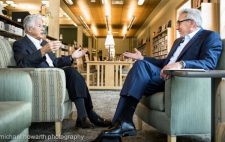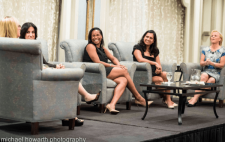Fresh out of college and into her first career, Deborah Harris never imagined she’d retire so early, but she always knew she was tucking away her money for something.
Harris was a lifelong saver, she admits. Even when she was a kid, she’d take her birthday card money and put it in the bank. So after almost 30 years of smart planning and investments, Harris found herself in an ideal situation: she could retire at age 50. Today, the Medford Lakes retiree says her cup is overflowing with activities, and she feels like she “won the lottery in her own world.” But Harris’ situation isn’t just a lucky break – armed with the right advice and careful planning, early retirement doesn’t have to be a fantasy.
Get into the habit of saving (and even investing) early
“Time is your best friend,” says Catherine Allen of M Financial Planning Services. “The younger you are, the longer you have for your money to grow.”
Harris says she was always on the conservative side and would bank every work bonus she earned. She didn’t feel like she was missing anything – she would still go on vacations and splurge here and there – but she made some other big decisions early on, too. Harris, now 59, recognized her employers’ commitment to match her 401(k) contributions was essentially “free money.” So she put in the maximum allowable amount, which was around 16 percent. Having an amount of every paycheck automatically deposited into her savings account also made it easier to put money aside.
“If you see it and you have it, you’re going to spend it,” says Harris. “Whatever I got, I lived on. You live to your means. Whatever I took home, I spent. But if it came out before that, I didn’t have to worry about it.”
She later invested in rental properties, which became a future income stream for when she retired. She also put some money into stocks and other conservative investments. While it might seem silly to think about saving for retirement at 20, 30 or even 40, saving early can pay itself back through compounding interest. Having enough money is the key to early retirement.
“You have to have the finances in order to do it,” says Stan Molotsky, president and CEO of SHM Financial Group. “If you’re thinking of retiring at some point, as we all should, you want to put aside a certain amount of money religiously, every single paycheck you get. If you can, save at least 10 percent of every check you get, whether it’s in securities or certificates of deposit (CDs).”
Know this won’t happen overnight
Even Molotsky says it’s unrealistic to wake up at 62 with expectations to retire at 64. So when Jane Arnold, former director of national operations for Verizon, was getting ready to retire from her 38-year career, she had a lot to think about: she was single with five children, four college tuitions, weddings and other expenses at the helm.
“I always saved, but I really didn’t know if what I was saving was enough or not enough,” explains Arnold, who decided to seek out a financial adviser to help her assess her finances and come up with a plan. She weighed her options carefully and looked closely at her priorities, but overall it took a good 10 years to get herself financially ready before she could retire two years ago at age 60.
“I think the biggest part was getting myself in shape financially. That was the hardest part,” she says. “Other people might be driving fancier cars or buying second homes. I decided that my priority was to be able to retire and enjoy myself – that was the toughest part.”
Think big picture when preparing
Going into retirement – early or not – with a mortgage or unpaid credit cards can be a scary prospect, so debt should be on a list of loose ends to tie up before making the jump. Harris says she worked hard to make sure she never owed more than she earned and even doubled up on mortgage payments at times to pay it off.
“I paid off mortgages as soon as I saw an imbalance between what my assets were earning and the mortgage interest rate,” she says. “I never had a car payment. I always paid cash for my cars. If I couldn’t afford the car, I didn’t buy the car. I kept my expenses in line with my income at all times. I didn’t get upside down on what I earned versus my bills. I think I knew fairly well enough in advance I was retiring, so I made sure I didn’t have any debt – credit card or otherwise.”
Consider professional help
Whether it’s investing, saving or starting a second career, it’s a good idea to get a sense of how to make money last after retirement. With longer life expectancies (particularly in women,) it’s possible an early retiree could live a lot longer in retirement than they ever did working. And if the plan falls short of the mark, it could be hard to get back into the working world when you’re 60 or older.
“You never want to retire early and need a do-over. If there is any risk of a do-over, it’s not worth doing it in the first place,” says Albert A. Fox, senior vice president and executive director for Fox, Penberthy & Dehn at Morgan Stanley.
Working with a financial professional can help someone understand not just their resources, but their liabilities, sources of cash flow and income, says Fox.
“It’s only with detailed planning that you can have the confidence to make a change at midlife or later,” says Fox. “It also helps ensure you’re going into an early-retirement decision with both eyes wide open and won’t get any surprises after you make a change and choose not to work.”
Figure out what’s next
As time ticked closer to retirement, Arnold says she had to figure out what she was going to do with her days and weeks when she wasn’t working.
“I was consumed by my job. I loved it, but the 50 to 60 hours a week I was working was going away,” she says. “All of a sudden, I’m not the boss anymore. I’m just me. Which is kind of cool, but I do know some people who had trouble adjusting to their new identity, yet I kind of prepared myself for that.”
Allen says one of her clients, who was a type-A personality and in a managerial position, felt lost once he retired and eventually saw a counselor to help him work through it.
“He had to learn to realize that he had his own worth,” says Allen. “He had to learn there is a lot more to him, and to life, than being in that management level and supervising people.”
Arnold, who had been a woodshop teacher early in her career, decided to use her skills and passion for volunteering to work with Habitat for Humanity. She also keeps busy with improvement projects around the house.
For Harris, it was teaching math, which was something she had always wanted to pursue.
If you’re not sure what you’ll do with all your new free time, Arnold has a simple solution: make lists of all the things you’d like to do next – whether it’s traveling, taking the grandkids on vacation or starting an art class. Cutting the cord of a long career can be daunting, but it doesn’t necessarily need to be all or nothing.
“Know what you want to get out of retirement,” says Arnold. “If you plan on weaning off, I think that’s a good approach. Go slowly.”














